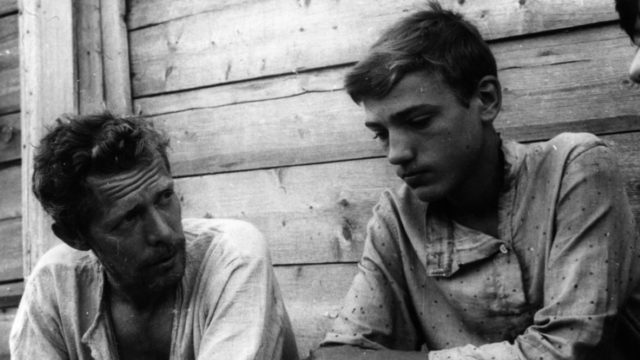
On Tuesday, Oct. 20, TCM’s Women Make Film series continues with episode eight of Mark Cousins’ docuseries Women Make Film: A New Road Film Through Cinema. The themes of the night’s programming: home, religion and work.
Encompassing all three themes — but not airing on TCM — is Homeland of Electricity, Larisa Shepitko’s second film made for the Soviet Union, but never released during her lifetime.
Made in 1967, Homeland of Electricity is the second of three 30-minute segments commissioned by the government to celebrate the October Revolution’s 50th anniversary. But when Shepitko and her comrades turned in their work, authorities rejected them for not being patriotic enough.
Watching them today, it’s no shock the government turned its back on the films — collectively titled Beginning of an Unknown Era. Shepitko opens her segment in a barren desert pocked by drought with the mysterious awakening of a young Christ-like figure. Shepitko films the man in stark black and white free of adornment. It’s like a Byzantine painting — ascetic and abstract.
The man follows a small religious procession to a nearby village void of food and water; drought has dried the earth to a crisp. The only thing of value the villagers possess is a motorcycle engine, which runs on grain alcohol distilled from petrified wheat. The cycle has no wheels, so the villagers use it to generate electricity to power light bulbs fastened to a star atop a pole.
Why waste electricity to power the star? Because it’s their only possession that might instill hope. And when the stranger proposes to use the engine to power a well-pump, water replaces the star.
It’s been said every generation brings a touch of apocalypticism to the table. From a micro-level, it’s understandable, especially from the viewpoint of Eden lost. But from a macro-level, it’s ridiculous to think this life-giving planet that has existed for billions of years will somehow, someway end on your watch.
That’s what makes Shepitko’s Homeland of Electricity powerful: It shows that no matter how far down we go, no matter how hard we are punched in the teeth and stripped of dignity and humanity, we will rise again. The world keeps turning, and what was once a waterless wasteland will soon be fertile farmland. All you need is hope, be it a star, a motorcycle engine or a water pump.

Shepitko never lived to see Homeland of Electricity theatrically released. She died in 1979 in a road accident at the age of 41. In 1987, 20 years after finishing Homeland of Electricity, the collection Beginning of an Unknown Era was finally screened with two segments — Angel from filmmaker Andrei Smirnov and Homeland of Electricity — playing the Moscow International Film Festival thanks to Mikhail Gorbachev’s glasnost policy. The third and final segment was lost and has yet to be found.
Search for Beginning of an Unknown Era at the excellent RussianFilmHub.com to stream Homeland of Electricity and tune-in Oct. 20 to TCM’s Women Make Film series.














